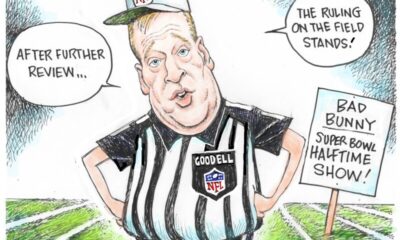World
Judges Mandate Use of Emergency Funds for SNAP Amid Shutdown

Two federal judges ruled on November 3, 2023, that the Trump administration must utilize emergency reserve funds to sustain the Supplemental Nutrition Assistance Program (SNAP) during the ongoing government shutdown. This decision, made by judges in Massachusetts and Rhode Island, allows the administration flexibility on whether to fund the program partially or fully for the month of November. As a result, uncertainty lingers over the payments, which typically recharge early in the month, potentially delaying assistance for many beneficiaries.
The U.S. Department of Agriculture (USDA) had previously indicated plans to freeze SNAP payments starting November 1, citing an inability to continue funding due to the shutdown. SNAP, which supports approximately 41 million Americans, is a crucial component of the nation’s social safety net, costing about $8 billion monthly.
U.S. Senator Amy Klobuchar, a Democrat from Minnesota and the ranking member of the Senate Agriculture Committee, pointed out that the judges’ rulings highlight the administration’s failure to meet its legal obligations. “The administration is choosing not to feed Americans in need, despite knowing that it is legally required to do so,” Klobuchar stated.
The legal challenge was spearheaded by Democratic state attorneys general and governors from 25 states, along with the District of Columbia. They contended that the administration has a legal obligation to maintain SNAP operations. The USDA previously indicated it could not access a contingency fund of about $5 billion, which had been designated for this purpose, despite earlier assertions that these funds would be utilized to support the program.
In a significant ruling, U.S. District Judge John J. McConnell in Rhode Island ordered that SNAP must be funded at least partially with contingency funds, seeking an update on progress by the following Monday. Judge McConnell also mandated that all previous work requirement waivers remain in effect, countering recent USDA actions that had terminated exemptions for seniors, veterans, and others.
Similarly, in Boston, U.S. District Judge Indira Talwani declared that the USDA must maintain SNAP funding, calling the suspension “unlawful.” She directed the federal government to inform the court by November 6 whether they would use emergency funds to provide either reduced benefits or full funding for the program.
Despite the rulings, many beneficiaries will still experience delays in receiving their payments this month. The process of loading SNAP benefits onto cards typically takes a week or more in several states, leaving many individuals and families in a precarious position.
The administration has not indicated whether it plans to appeal the judges’ decisions. State governments, food banks, and SNAP recipients are preparing for a possible shift in how low-income individuals access food assistance. Advocates warn that halting food aid could force families to choose between buying groceries and covering other essential bills.
In response to the uncertainty, many states have announced additional funding for food banks or implemented expedited measures to load at least some benefits onto SNAP cards. Diane Yentel, president and CEO of the National Council of Nonprofits, one of the plaintiffs in the Rhode Island case, expressed relief at the rulings, noting that they help prevent a significant burden on nonprofit organizations.
The potential for reduced benefits continues to create anxiety among individuals relying on SNAP. Kristle Johnson, a nursing student and mother of three in Florida, highlighted her concerns about the impact of benefit reductions. “Despite careful budgeting, my $994 monthly benefit does not cover a full month’s groceries,” Johnson stated.
On the political front, Agriculture Secretary Brooke Rollins criticized Democrats for their handling of the situation, accusing them of a “disgusting dereliction of duty” for failing to resolve budget negotiations that could prevent such funding issues. A recent attempt to secure continued SNAP funding during the shutdown was unsuccessful in Congress.
The ruling, while providing immediate relief, does not entirely resolve the ongoing partisan disputes surrounding SNAP funding. Skye Perryman, president and CEO of Democracy Forward, emphasized that the court’s decision protects millions from being caught in political crossfire, affirming that no one in America should go hungry.
As the situation develops, SNAP recipients and advocates remain hopeful yet cautious, aware that the future of food assistance hangs in the balance.
-

 Science2 weeks ago
Science2 weeks agoResearchers Challenge 200-Year-Old Physics Principle with Atomic Engines
-

 Politics2 weeks ago
Politics2 weeks agoNHP Foundation Secures Land for 158 Affordable Apartments in Denver
-

 World1 week ago
World1 week agoBoeing’s Aircraft Production: Assessing Numbers and Challenges
-

 Lifestyle1 week ago
Lifestyle1 week agoRed Bluff High School’s Elli Nolan Named Rotary Student of the Month
-

 Lifestyle6 days ago
Lifestyle6 days agoTrump’s Push to Censor National Parks Faces Growing Backlash
-

 Entertainment7 days ago
Entertainment7 days agoSyracuse Stage Delivers Lively Adaptation of ‘The 39 Steps’
-

 Health2 weeks ago
Health2 weeks agoNeuroscientist Advocates for Flag Football Until Age 14
-

 Lifestyle2 weeks ago
Lifestyle2 weeks agoLongtime Friends Face Heartbreak After Loss and Isolation
-

 Science1 week ago
Science1 week agoAI Misidentifies Doritos Bag as Gun, Triggers Police Response
-

 Politics6 days ago
Politics6 days agoNFL Confirms Star-Studded Halftime Show for Super Bowl LVIII
-

 World2 weeks ago
World2 weeks agoGlobal Military Spending: Air Forces Ranked by Budget and Capability
-

 Health2 weeks ago
Health2 weeks agoFDA Launches Fast-Track Review for Nine Innovative Therapies









